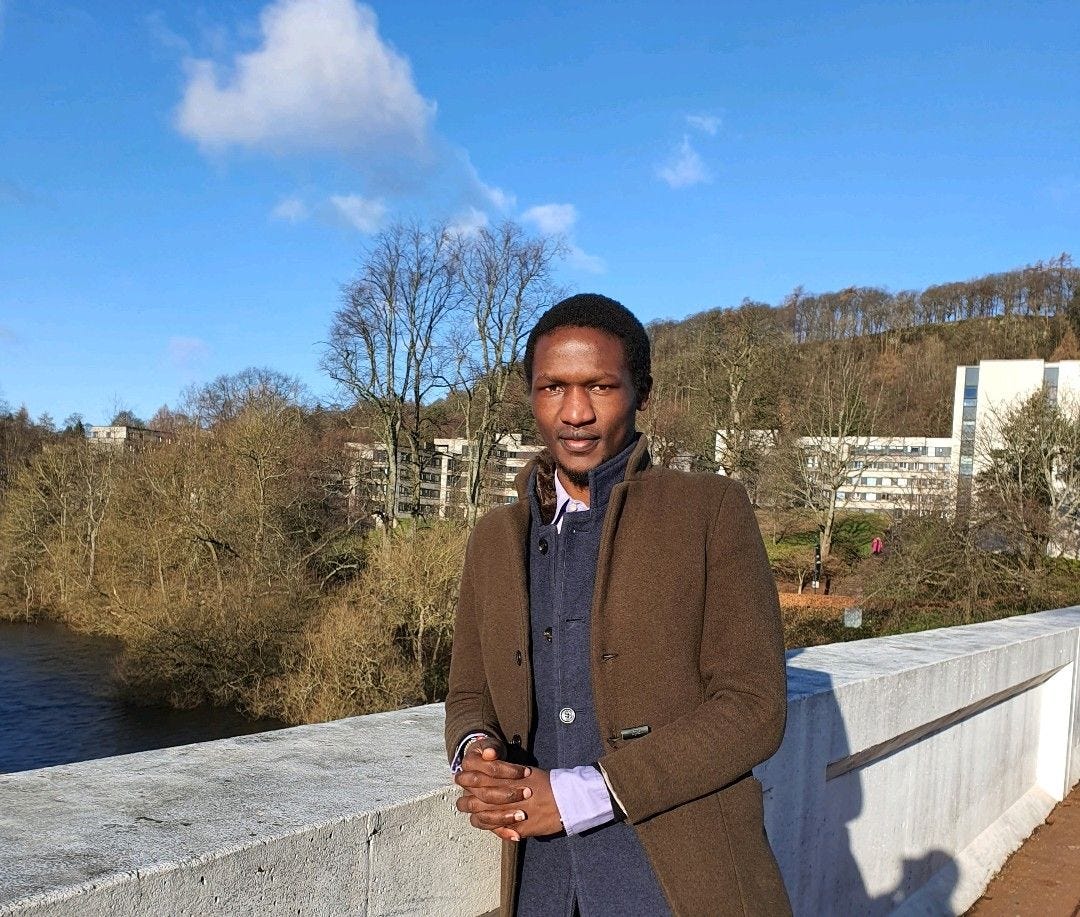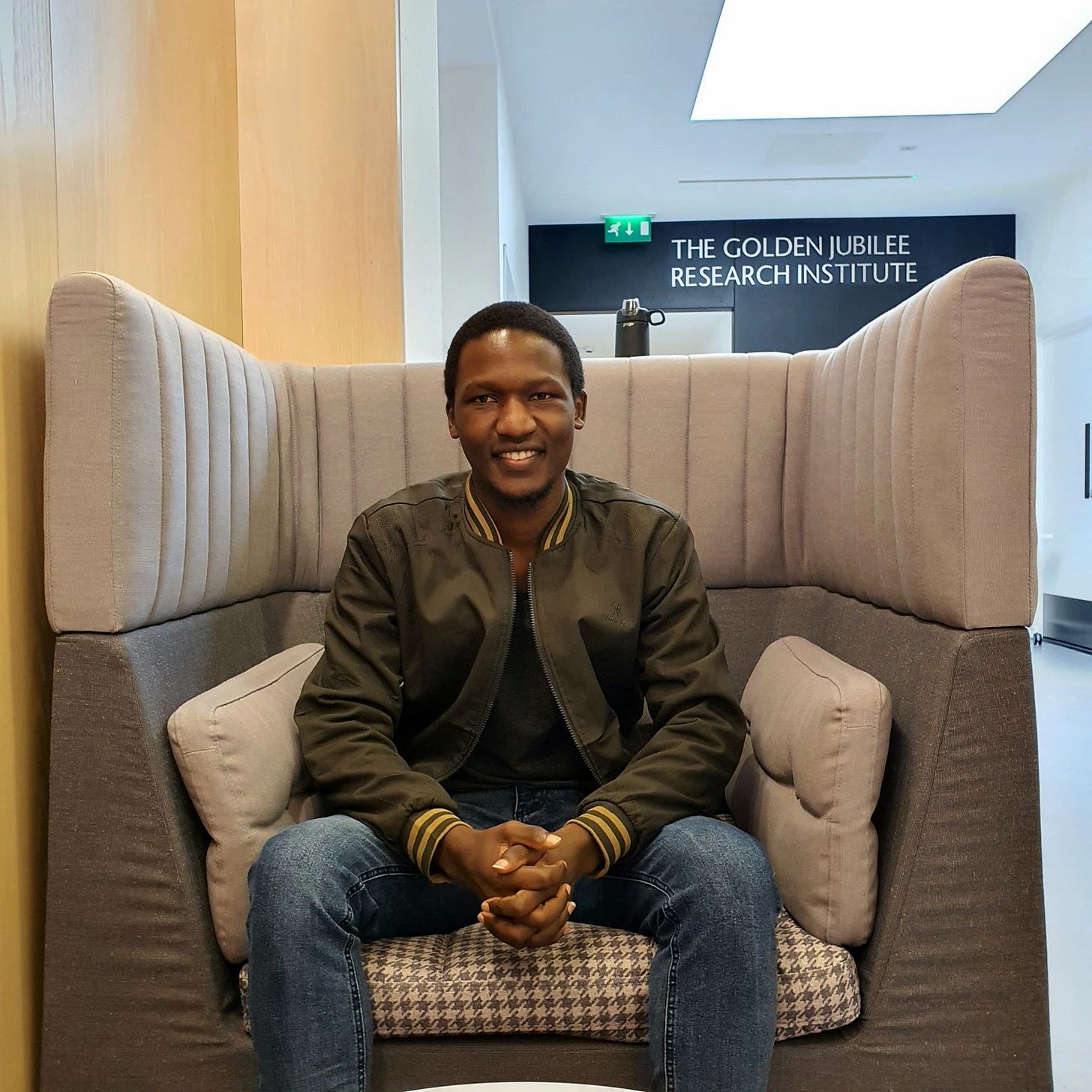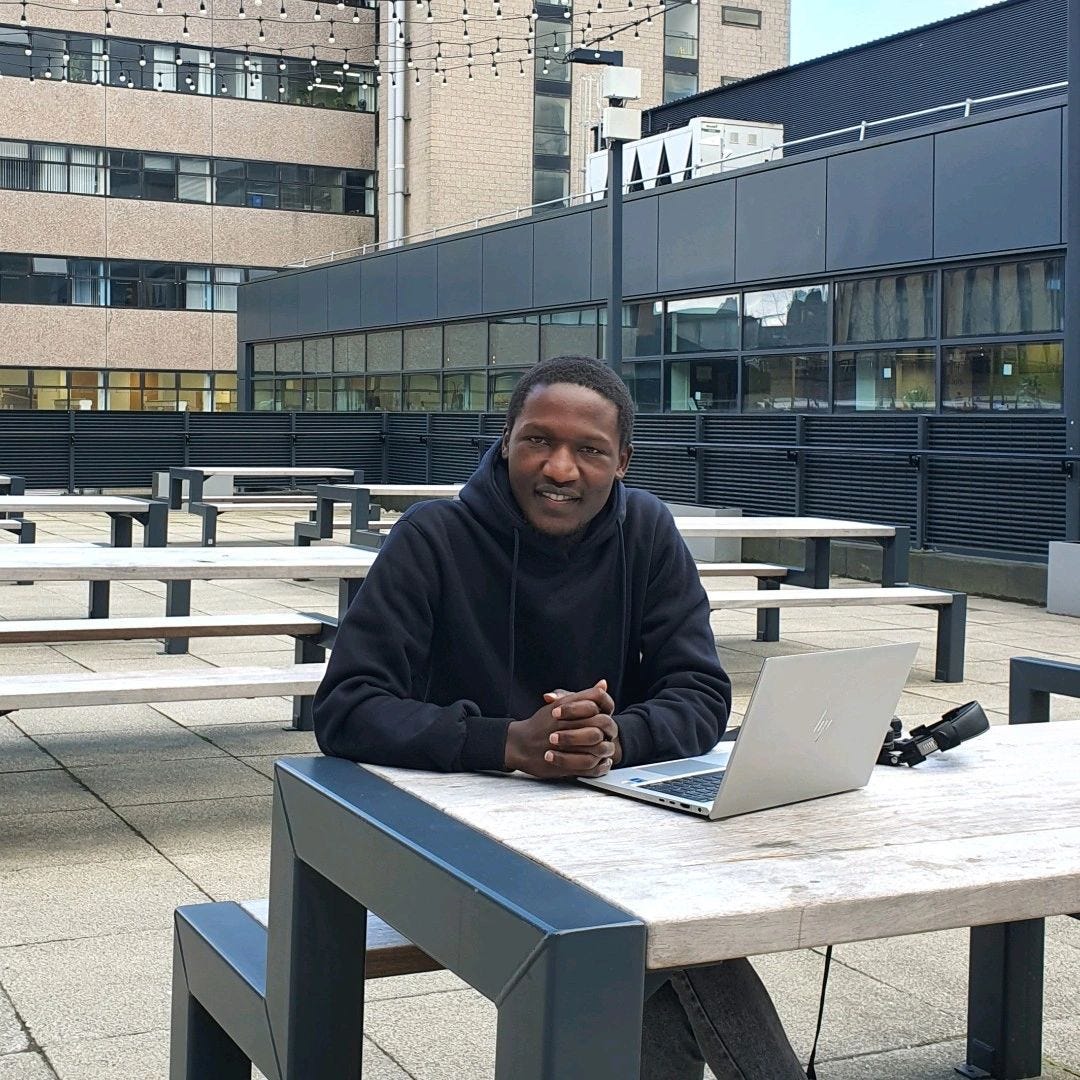‘We Have Come From Good Places’
A Kenyan Man’s Love for Home and Country
"I only read that line, 'under exceptional circumstances,' and immediately sat down to write my application. And here I am." Omae Joseph, a Kenyan immigrant, explained what gave him - who had been in the UK for less than a year at the time - the courage to apply for a scholarship primarily intended for British citizens. Now, nearly two years after temporarily relocating from Kenya to the United Kingdom to study, Omae reflects on his journey. This interview happened during a period of agitation in Kenya, marked by widespread protests by Kenyan youths against the now-withdrawn Finance Bill and the President dissolving his cabinet as a result. As we sat down, the young scholar shared his immigration journey, his enduring connection to his home country, and his vision for building an ecosystem of young Africans equipped to drive meaningful change across their respective countries.
On Omae’s first day in the United Kingdom, he says he was "grossly uninformed" and could have been stranded. He thought that it would be possible to get a hotel in the town where his university was upon arrival. He had come in on a Commonwealth Shared Scholarship and the funding organisations had briefed him and his colleagues about the culture of the United Kingdom and its people. For his travel, he had even been given a train ticket to get from the train station in Edinburgh to Stirling, where his school is located. But Omae says a lapse in judgement and research on his part almost left him high and dry in central Scotland’s dreich weather.
He landed around 4 p.m., excited about the prospect of having his open mind filled with the highs and lows of international business and what that would mean for his grand plan for the study. He had taken a connecting flight from Turkey, and while on the plane, there had been some type of argument involving drunk passengers, which made the alighting process—typically requiring patience and a truckload of tolerance—harder than usual, with people stuck in the same spot for some time, and then in a bit of a rush to get off. While this was happening, he spotted an older gentleman who was blocked from getting out into the aisle due to the ceaseless flow of irritated and predictably impatient passengers. Omae stepped in front of the other passengers and urged the man to move forward. It was a small gesture, and Omae thought any young person would do the same for an older man.
After he alighted, Omae, who did not yet have access to the internet—because he was yet to get a SIM card—wanted to know where the train station was. He asked the only familiar face he saw—the man from the plane—who asked a few questions and told Omae to go ahead with his immigration checks and meet him on the other side after he had been granted entry into the country. As it turned out, the man, like Omae, was on his way to Stirling and invited Omae to ride with him and his wife instead of taking the train.
On their way, they had a bit of a chat, and the couple realised that Omae’s plan for accommodation was to walk into a hotel in the small city of Stirling and book a room for the night. This was in late September of 2022, when the University of Stirling, like many universities in the United Kingdom, was starting a new session. Many students were coming from different parts of the world, most of whom the school would not be able to accommodate due to a lack of space. That was something Omae did not realise, but his kind chauffeurs did. They invited him for tea —which Omae thought meant a cup of tea instead of dinner—and then offered an en suite room in their home with his own access and privacy. Omae was offered a space to spend the weekend with them instead of at the hotel, which he clearly would have had a hard time finding, and leave for his school-assigned accommodation when it opened up two nights later.
"They just told me, in case you need anything or you are feeling hungry, the kitchen is there. You can come and prepare what you want. I was like, yeah? Me cooking in your kitchen? I thought I'm a guest. So they were like, 'yeah, you can just come prepare anything you want. This is the food. So in case you need to eat or anything, just come, prepare anything you need.'"
"I came out later and ate some fruit, just to be sure that I could get anything. Then I went back, stayed up there. The next day, Omae’s host took him on a tour of Stirling and the neighbouring villages. Later that day, he informed Omae that he would be travelling on a work tour and that his wife would be available to help him settle in.
She took Omae shopping and showed him which shops to buy from in times of austerity and which for times of prosperity—essentially the difference between Lidl/Aldi - with its low prices - and Waitrose with its premium shopping experience.
On the day his hostel opened, he was driven to his university hostel by the lady and her child, and they helped him set up the room. It’s the type of thing his family and close friends would do for him if he were back home in Kenya. That was the kindness that welcomed Omae to the United Kingdom, to Scotland. It’s a first impression that leaves one assured of the quality of people one might encounter on your new adventure—a gesture of hospitality that is, perhaps, rare, especially in the UK.

Omae had spent some time working in Kenya as an Investment Analyst and had started a postgraduate degree, which he had to defer to take up the scholarship opportunity at the University of Stirling. For him, his motivation for choosing to leave Kenya for the United Kingdom was simple and straightforward. As he puts it, "We want to do business with people all over the world. The best way we are going to do these things as peers is we sit down, study their system, help them understand our system, and then we get to share our ideas. In my view, education is one way to study that. I understand how things work in Kenya, and I did my master's here. I'm doing my PhD here. The UK attracts people from all over the world. So when I was doing my master's, I met persons from over 50 countries. If I want to speak to somebody in Iraq right now, if I want to speak to somebody in Nigeria or South Africa right now, I can pick up my phone and call them. And I don't even need an introduction because we are buddies now. And that is what we need for business."
Omae intends to return to Kenya to work on making business more productive and efficient. He has his eyes on the stock market there. Apart from the fact that Kenya is home and where his heart is, Omae said "Kenya is still a growing country. There are a lot of opportunities. The environment there is welcoming."
Coincidentally, this interview was conducted while youths in Kenya were protesting against bad governance. The protest began with a single goal of getting the government to back down from a Finance Bill that would have raised taxes and put the already struggling masses under more financial stress. What should have been a peaceful protest turned violent when armed government agents used tear gas and stun grenades on protesters. In a couple of weeks, young Kenyans were able to get the government to throw out the Finance Bill and get the president to dissolve his cabinet. In many African countries, protests against poor and tone-deaf leadership have become fairly common, with Nigeria and Uganda following a few weeks later.

Emphasising his passion for his country, and his thoughts on the protest, Omae said "if you ever got into my head right now, you would know that 99% of my thoughts are in Kenya. My mind is there, my heart is there, my blood is there. I left my entire family there. I'm doing my investments there. What you are seeing in Kenya is an activity motivated by people who are informed, people who can fetch information for themselves. We don't need to wait to be told about the constitution over the weekend by some analyst. We can read the constitution. What is happening in Kenya is motivated by young people who have information, who have skills, who have resources, who have time, but who don't have an opportunity to implement all these things. If we get suffocated from all angles, then how do we exist? If the pressure from the inside increases, then we have to break the whole shell and start something new." While he acknowledges that issues like nepotism and subpar governance are challenges his home country faces, Omae does not see them as reasons to leave for good—not for him, at least.
As he puts it, "the UK is just a normal society like ours. They have poor people. They have people who are going without food. They have people who are going without clothing. So it means it is not a unicorn. It's not a perfect society. So as much as there are things that outperform us, there are things where we are equally at par. We just need to know where we are and how we can get to the next level."
In some ways, Kenya has shown signs of a commitment to growth and does have the indices necessary for one to assume that it may be on its way up. According to the World Bank, the country’s GDP improved from 4.9% in 2022 to 5.6% in 2023. It also witnessed a reduction in the poverty rate, with its agricultural sector showing resilience as it recovered better than expected after two years of drought. While it's not outperforming most countries in the world. It's doing better than many of its regional peers and some developing nations. However, there are concerns that economic growth may slow down in the coming year due to various challenges, including global economic conditions and domestic factors.
In order to facilitate the change he wants to see, Omae has not only dedicated himself to studying investment analysis across cultures, but he is also working to effect positive change by building a continent-wide network of young Africans. He is holding the door open to international academic opportunities for fellow young people, hoping that they too will remain committed to change—whether in their countries of origin or the countries they migrate to. For him, it's about increasing the number of people who can interpret and implement positive change, thereby creating a society equipped to optimise opportunities.
“Some people usually think speaking English is a measure of intelligence. I came here and realised some people can only speak English. I was so disappointed.”
Omae graduated with first-class honours in his undergraduate degree and earned a distinction in his master's, even being awarded the Walter Scott Global Investment Management Prize. Through his interactions with peers, he has noticed that his status as a high achiever often leads people to believe that the opportunities he has received are unattainable for them. "People think they can't mimic my way of doing things. So the best thing I can do to convince them that it is possible is to share other people’s stories."
Omae started The Management Diary, an online space where he shares scholarship opportunities and the stories of individuals who have taken advantage of such opportunities in the past.
"I have featured someone with a second class lower division who got a lot of scholarships. You don't need to be the top student in your master's program to get a scholarship, but you won’t believe me if I tell you that because we both know I was. So I need to tell you about somebody who didn't get a first class, yet got a scholarship, and how they did it."
So far, Omae says The Management Diary has helped three people secure fully funded PhD programs, with many more in the pipeline, including some who have already started their master's programs. This is accomplished by providing resources for their applications, reviewing these applications with them, and guiding them as they work to secure scholarships. He hopes that it will make a significant difference for people who are looking to have international experience and exposure but have little resources for it. In his words "I will help this one guy today; tomorrow this guy will help another two people. And we will have a whole network of people helping each other."
On being an immigrant and how he navigates spaces in his current country of residence, Omae said, “If (Aliko) Dangote or the late (Chris) Kirubi wanted to live anywhere in the UK, Europe, or any developed country, they could. And you wouldn't hear them being called immigrants even for a single day. You would hear, ‘businessman Dangote will be in London today,’ right? You have to show your value. You have to earn respect. You have to be known for what you're doing, and you will be recognized by that badge. I am a researcher, so I should be addressed as such as long as I have created value and contributed something as a researcher.” This assertive stance gave him the courage to apply for the scholarship that he is currently on.
“The PhD I applied for is a funded one, and the funding criteria read, ‘This is an opportunity for UK students. And under exceptional circumstances, we can consider international students up to a maximum of 30% of the scholarships.’ You see, I only read that line ‘under exceptional circumstances’ and sat down and started writing my application. And here I am. So it shows you that we are no lesser than anybody else. If they really meant what they said, then yeah, you have your answer. It was an exceptional thing, and it is what it is.”
In what can be described as a passionate speech, Omae began to talk about how important it is for immigrants to appreciate themselves.
“We are also coming from good places, really good places. And we are happy about those places. It is good we are here, but we are happy about where we come from, and we respect where we come from.
In my PhD lab, we don't have any nationality represented by more than one person. We come from different countries. And when we discuss, it’s clear that the ability, intelligence, interest, and perspective that people have is more important than where they come from. If a person is smart, that person is smart, irrespective of where they're coming from. And the opposite also holds true. Every society has a fair distribution of different types of people.
We can't use one lens or one metric to gauge. Some people usually think speaking English is a measure of intelligence. I came here and realised some people can only speak English. I was so disappointed because, for us, English is one of several languages. I can speak four other languages. For me, it's normal.”
Omae firmly believes that the future of our countries rests in the hands of many immigrants. To shape that future, it's essential for immigrants to acquire the knowledge, connections, and resources available to them. To achieve this, they must first recognize and embrace their own value.
It is Omae’s hope that people can both give and take value from the places they go for school, work, or play. Part of it includes learning about other cultures as he has—one example being the invaluable experience of getting good jollof by having a Ghanaian and a Nigerian defend their country’s turf in the ever-relevant jollof war and volunteering as a judge when they battle it out. He is learning to understand the Scottish accent and why it is different, why the UK has hot and cold taps, the culture of the different countries represented in his PhD cohort and how all of that and more can be applied in the business world where he hopes to flourish. It’s a big world, Omae believes, and it’s lucky enough to have you in it, so explore, learn, and give back.



Looking forward to many more stories and articles from you.